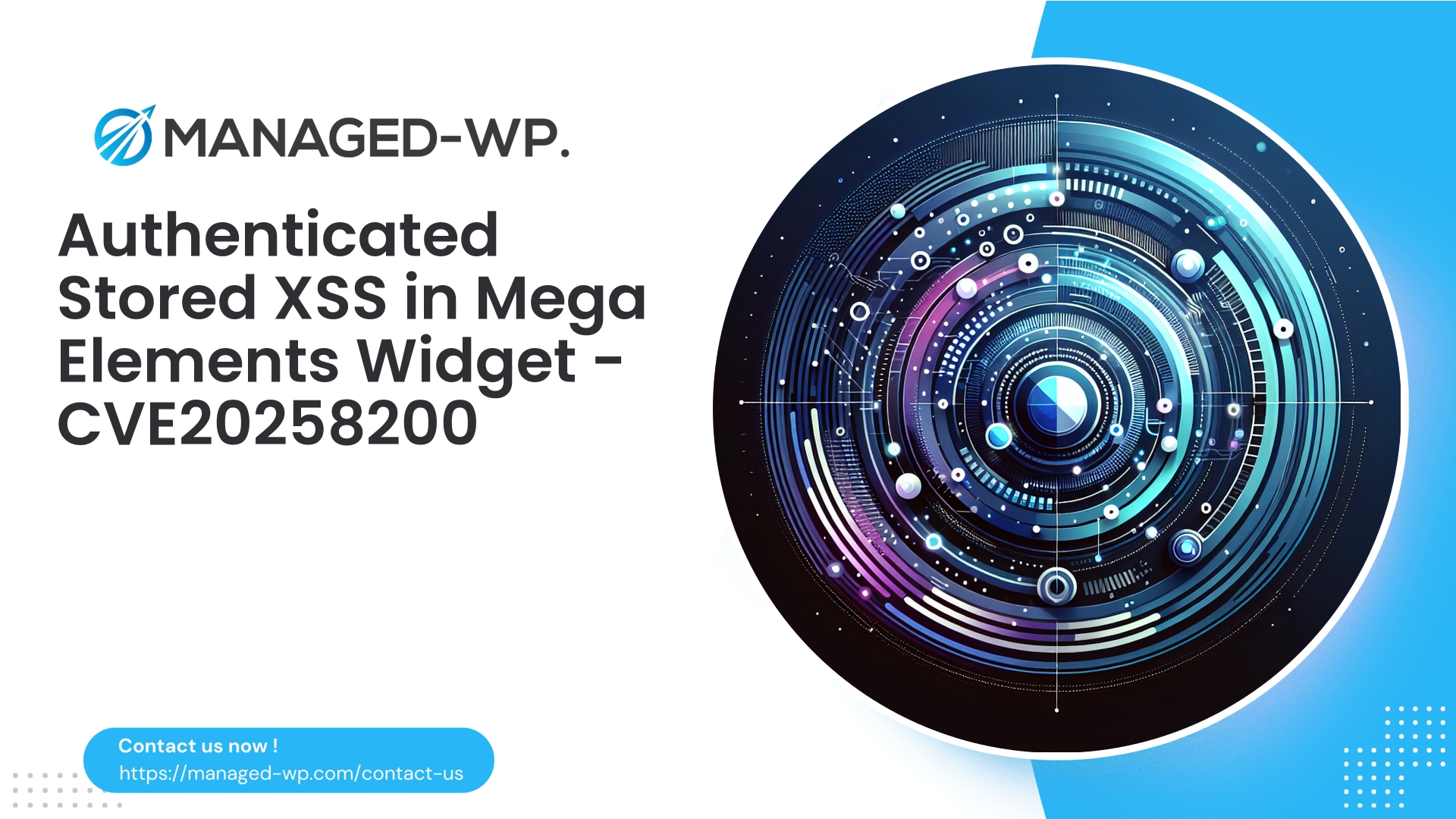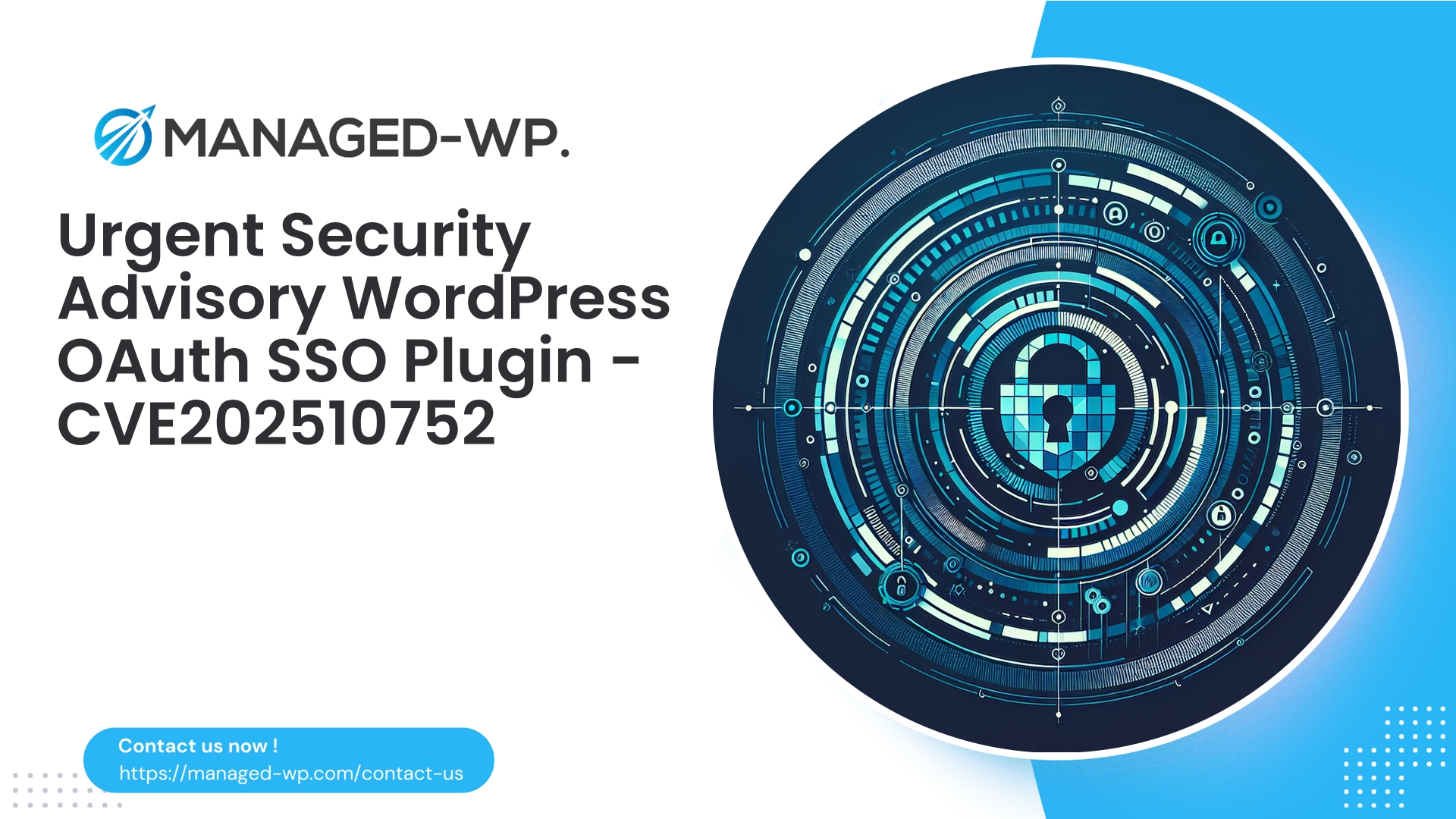| 插件名称 | 巨型元素 |
|---|---|
| 漏洞类型 | 已认证存储型 XSS |
| CVE编号 | CVE-2025-8200 |
| 紧急 | 低的 |
| CVE 发布日期 | 2025-09-25 |
| 源网址 | CVE-2025-8200 |
Mega Elements (≤ 1.3.2) — 倒计时小部件中的已认证贡献者存储型 XSS:风险评估、检测和缓解策略
作者: 托管 WP 安全咨询团队
日期: 2025-09-26
执行摘要: 一个存储型跨站脚本 (XSS) 漏洞(编号 CVE-2025-8200)已公开披露,该漏洞影响 Elementor 的 Mega Elements 插件,版本最高至 1.3.2。此漏洞允许具有“贡献者”级别权限的已认证用户在倒计时小部件中注入恶意脚本,这些脚本随后会在访问者的浏览器中执行。本技术公告深入分析了该漏洞的风险、实际利用场景、紧急遏制措施、推荐的虚拟补丁措施以及可持续的安全最佳实践。强烈建议 WordPress 网站管理员遵循本文中的指导,以保护其环境免受漏洞利用。
目录
- 背景:漏洞概述
- 理解存储型 XSS:安全视角
- 剥削潜力:谁、如何以及何时
- 评估 WordPress 部署的暴露情况
- 受影响设施的紧急补救措施
- 虚拟修补:WAF 临时保护策略
- 推荐的服务器和应用程序加固实践
- 事件响应:安全清理和恢复
- 持续监测、检测和测试建议
- 缓解未来插件相关的 XSS 漏洞
- 关于 Managed-WP 的安全支持计划
- 结论和更多资源
背景:漏洞概述
Mega Elements 插件(Elementor 插件),版本 ≤ 1.3.2 存在存储型 XSS 漏洞 (CVE-2025-8200),允许已认证的贡献者将恶意 JavaScript 代码持久化到倒计时小部件的配置中。这些代码会被保存到 WordPress 数据库中,并在呈现给网站访问者或管理员的页面上下文中执行,从而可能危及会话完整性和用户安全。
- 插件: Mega Elements(Elementor插件)
- 受影响版本: ≤ 1.3.2
- 补丁可用: 版本 1.3.3 及以上
- 漏洞类型: 已认证的存储型跨站脚本攻击 (OWASP A7)
- 所需权限级别: 贡献者(已认证用户)
- 信息披露: zer0gh0st
- CVE 参考编号: CVE-2025-8200
尽管名义上的紧急程度较低,但考虑到存储型 XSS 攻击的持续性和隐蔽性,以及网站访问者和管理员可能面临的风险,这种漏洞需要立即引起重视。
理解存储型 XSS:安全视角
存储型跨站脚本攻击是指将包含恶意 HTML 或 JavaScript 的不受信任的输入持久存储在服务器上,并在未进行适当清理的情况下将其渲染到网页中。这会导致浏览器将攻击者控制的脚本解释为可信内容,从而引发严重的安全问题,包括:
- 通过窃取身份验证 cookie 进行会话劫持(如果未使用 HttpOnly 进行保护)
- 持续篡改网站或未经授权重定向网站访问者
- 通过注入脚本发起恶意下载来传播恶意软件
- 利用可信网站上下文的定向社交工程攻击
- 如果管理员用户查看恶意内容,则可能导致权限提升。
鉴于此漏洞与组件密切相关,所有嵌入受影响的倒计时器组件的页面都将面临风险,直到有效载荷被识别和清理为止。
剥削潜力:谁、如何以及何时
只有拥有已认证的“贡献者”角色的用户才能利用此漏洞。了解这种访问控制限制对于进行切合实际的风险评估至关重要:
- 贡献者可以撰写和保存内容,包括与小部件的交互,但通常不能直接发布内容。
- 常见的工作流程允许贡献者访问受信任的第三方,例如自由撰稿人、客座作者或承包商。
攻击场景可能包括:
-
恶意客座投稿人:
- 攻击者注册成为贡献者,将恶意脚本注入到小部件配置字段中,并将这些脚本持久化到数据库中。
- 当网站所有者、编辑或访问者查看包含被入侵小部件的页面时,这些脚本就会执行。
-
贡献者凭证泄露:
- 弱密码或凭证重复使用导致的账户被盗用,使得恶意载荷注入成为可能。
-
供应链或内容工作流程滥用:
- 拥有贡献者权限的第三方内容提供商可能会在不知不觉中或故意引入有害脚本。
虽然贡献者不能直接发布内容,但预览功能和管理内容审核为攻击者提供了可行的执行途径。
评估 WordPress 部署的暴露情况
-
插件版本审核:
- 通过 WordPress 管理后台的插件面板或 WP-CLI 等集中管理工具确认 Mega Elements 插件版本。
-
小部件和数据库检查:
- 搜索倒计时计时器小部件实例,并使用如下查询检查存储的 HTML 中是否存在可疑的脚本或事件处理程序:
SELECT post_id, meta_key, meta_value FROM wp_postmeta WHERE meta_value LIKE '%
- 检查插件特定的元数据字段,以查找注入信号。
-
用户角色审核:
- 审核所有具有“贡献者”或更高权限的帐户,识别未经授权或可疑的用户添加。
-
服务器日志分析:
- 查看与可疑内容保存时间相关的管理端点(admin-ajax.php、REST API)的 POST 请求日志。
-
取证与数据保存:
- 如果怀疑存在漏洞利用,请在采取补救措施之前保存相关日志和数据库快照。
受影响设施的紧急补救措施
此漏洞需要立即采取措施加以缓解。建议立即采取的关键措施包括:
-
升级插件:
- 请将 Mega Elements 更新至 1.3.3 或更高版本以修复此漏洞。
-
如果立即更新不可行:
- 通过 Web 应用程序防火墙 (WAF) 进行虚拟修补,以阻止攻击尝试(详见下文)。
- 暂时限制投稿人的编辑权限:
- 禁止贡献者编辑前端小部件。
- 撤销或暂停新注册或未经核实的贡献者帐户。
- 从公共页面中移除受影响的倒计时器小部件。
-
用户账户安全:
- 强制执行密码重置,加强身份验证策略,包括对编辑和管理员实施双因素身份验证 (2FA)。
-
内容清理:
- 手动查找并删除数据库中的脚本标签或可疑的 HTML 属性(更改前请备份)。
-
交通和活动监控:
- 注意连接数、管理员登录次数或文件系统更改方面的异常峰值。
-
恶意有效载荷处理:
- 立即隔离并清除检测到的恶意载荷。
- 对可能已被盗用的账户进行密码和密钥轮换。
- 必要时从干净的备份中恢复。
虚拟修补:WAF 临时保护策略
强烈建议部署 Web 应用防火墙 (WAF) 作为临时防御措施,以在执行更新和清理工作期间阻止或减轻攻击尝试。Managed-WP 建议采用以下针对常见 WAF 平台定制的虚拟修补策略:
笔记: 虚拟修补应该作为对底层漏洞修补的补充,而不是替代。
1)阻止管理员 POST 请求中的可疑 HTML 标签和事件处理程序
识别并拒绝包含以下内容的 POST 请求 标签或事件属性,例如 错误= 或者 onload= 在典型的组件配置端点上。
安全规则 REQUEST_URI|ARGS_NAMES|ARGS|REQUEST_HEADERS|XML:/* "(?i)( <script\b| |on\w+\s*=|javascript:|data:text/html)" \ "phase:2,rev:1,severity:2,id:1001001,deny,log,msg:'潜在的存储型 XSS 尝试已被阻止',t:none,t:lowercase"
2) 限制对小部件配置 AJAX 和 REST API 端点的访问
配置规则以防止非管理员用户通过 admin-ajax.php 或与小部件配置关联的 REST API 端点发送可疑有效负载。
- 阻止权限不足的用户向这些端点发送包含脚本相关有效负载的 POST 请求。
3)清理响应内容(响应拦截)
高级WAF可以检查和修改传出的HTML响应,以在到达用户之前消除嵌入的脚本标签。
- 代替
向非管理员用户提供的页面中,标签会使用转义后的等效项。
4)检测并阻止请求中常见的XSS有效载荷模式
使用正则表达式模式检测传入请求中的脚本标签、JavaScript 协议和危险的 DOM 方法,特别是针对管理端点的请求。
(?i)(<\s*script\b| |on\w+\s*=\s*['"]?|javascript:|data:text/html|eval\(|document\.cookie|window\.location|innerHTML\s*=)
5) 对身份验证 Cookie 和用户代理标头强制执行健全性检查
阻止缺少有效 WordPress 登录 cookie 或显示可疑 User-Agent 字符串的请求,特别是对管理区域的 POST 请求。
6)实施严格的内容安全策略(CSP)
通过实施 CSP 标头,您可以将脚本执行限制在受信任的来源,从而显著降低 XSS 漏洞的影响。
Content-Security-Policy: default-src 'self'; script-src 'self' https:; object-src 'none'; base-uri 'self'; frame-ancestors 'none'; block-all-mixed-content;
推荐的服务器和应用程序加固实践
-
永久修复:插件升级
- 请确保 Mega Elements 已更新至 1.3.3+ 版本,并彻底测试网站功能。
-
应用最小权限原则
- 仅允许那些严格需要编辑控件的角色拥有编辑控件的权限。
- 利用能力管理插件来改进访问控制。
-
加强身份验证
- 强制要求编辑和管理员使用双因素身份验证。
- 对于企业环境,请使用强密码策略并考虑使用单点登录 (SSO)。
-
使用内容清理库
- 处理用户生成的内容时,请使用安全的 HTML 过滤工具(例如 HTML Purifier 或 WordPress 的 wp_kses)。
-
加强管理访问权限
- 尽可能通过 IP 或 VPN 网关限制对 wp-admin 的访问。
-
管理版本和使用暂存环境
- 在正式部署之前,请在测试环境中测试所有插件升级。
- 维护一份全面、最新的已安装插件清单。
-
实施完善的备份和恢复流程
- 对文件和数据库进行频繁的异地备份,并具备经过测试的恢复能力。
-
启用详细日志记录和警报
- 记录所有管理 POST 请求,并监控异常或可疑活动。
事件响应:安全清理和恢复
一旦检测到已存储的 XSS 有效载荷,请按照以下步骤操作以确保有效修复:
-
保存证据:
- 导出受感染的数据库行并安全地保存相关日志,以支持取证分析。
-
移除恶意载荷:
- 使用有针对性的 SQL 查询或 WordPress UI 工具清理或删除恶意脚本标签,但务必先备份数据库。
- SQL 更新示例:
UPDATE wp_postmeta SET meta_value = REPLACE(meta_value, ' ', '') WHERE meta_value LIKE '%
-
轮换凭证和密钥:
- 重置所有可能受影响的用户和服务的密码和 API 密钥。
-
执行恶意软件和持久性扫描:
- 扫描文件系统、数据库、主题/插件目录,查找后门或未经授权的修改。
-
如有需要,请从备份中恢复:
- 如果感染范围较大或仍存在不确定性,请回滚到已验证的干净备份。
-
修复后重新扫描:
- 彻底核实有效载荷是否已被清除,以及站点是否安全。
-
通知利益相关者:
- 根据数据泄露和事件响应政策与受影响的用户进行沟通。
持续监测、检测和测试建议
- 自动执行数据库扫描:
- 定期检查存储内容中的脚本标签和可疑的HTML属性。
- 监控网络日志:
- 通过 admin-ajax.php 和 REST API 密切监控管理员 POST 活动,并进行异常检测。
- 前端行为监控:
- 部署合成监控以检测意外的内容注入或页面行为的变化。
- 安全回归测试:
- 通过在测试环境中尝试模拟贡献者级别的 XSS 有效载荷提交来验证已修补的环境。
- 持续改进:
- 时刻关注插件开发者的安全信誉;优先选择那些定期更新且信息披露政策透明的插件。
缓解未来插件相关的 XSS 漏洞
- 供应商安全审查:
- 选择那些积极维护、有详细变更日志记录、并且能够及时响应安全问题的插件。
- 基于角色的访问控制:
- 最大限度地减少组件编辑权限,并将内容创建与发布流程分开。
- 服务器端输入验证:
- 对所有用户输入实施严格的清理,利用诸如 wp_kses 或 HTML Purifier 等成熟的库。
- 结构化内容审查:
- 强制执行严格的发布流程,要求受信任的编辑在正式发布前验证内容。
- 保持虚拟补丁功能:
- 利用能够快速部署规则的 WAF 来防御新披露的插件漏洞。
关于 Managed-WP 的安全支持计划
使用 Managed-WP 的免费基础安全计划加速保护
Managed-WP 提供免费的基础安全方案,可提供即时托管的防火墙保护,包括应用层 Web 应用防火墙 (WAF)、恶意软件扫描以及针对 OWASP Top 10 漏洞(例如存储型 XSS)的缓解措施。此解决方案可帮助 WordPress 网站所有者显著缩小攻击面,同时解决安全漏洞。
请在此注册 Managed-WP 的基础安全计划: https://my.wp-firewall.com/buy/wp-firewall-free-plan/
对于高级自动化、虚拟补丁和事件响应,请考虑升级到 Managed-WP 的标准版或专业版计划,以简化持续的安全管理。
补救后实用测试清单
升级和清理工作完成后,请按照以下清单确认修复完成:
- 请确认所有受影响环境中的 Mega Elements 插件版本均为 1.3.3 或更高版本。
- 审核所有存储的小部件和 postmetadata,查找残留脚本片段或可疑内容。
- 在测试环境中执行贡献者工作流程测试,以确认输入清理和注入脚本的阻止。
- 在监控模式下部署虚拟补丁 WAF 规则 7-14 天,并进行调整以最大限度地减少误报。
- 修复完成后,至少继续监控管理员活动和流量异常情况 30 天。
结论
Mega Elements 的存储型 XSS 漏洞凸显了 WordPress 插件生态系统中输入过滤不足带来的持续风险,尤其是在那些赋予贡献者级别用户小部件配置权限的插件中。虽然身份验证要求在初期设置了一定的安全屏障,但凭据泄露或社会工程攻击等手段会降低实际应用场景中的风险阈值。
网站管理员应优先执行以下操作:
- 立即将 Mega Elements 插件升级到 1.3.3 或更高版本。
- 当无法立即更新时,通过 Managed-WP 或同等的 WAF 解决方案实施虚拟修补。
- 对存储的小部件数据进行全面审计和清理,以删除注入的有效载荷。
- 严格执行最小权限原则和多因素身份验证,适用于编辑角色。
- 部署持续监控和输入过滤最佳实践。
对于管理多个 WordPress 站点的组织而言,Managed-WP 的免费基础安全计划提供强大的托管防火墙和扫描服务,以降低风险并简化漏洞响应。访问 https://my.wp-firewall.com/buy/wp-firewall-free-plan/ 了解更多信息并注册。
保持积极主动和高度警惕。有效的安全是一个持续的过程,需要及时更新、多层防御和认真执行。
参考文献及延伸阅读
- CVE-2025-8200 官方 CVE 条目
- Mega Elements插件的变更日志和补丁说明
- OWASP 跨站脚本攻击 (XSS) 指南



















